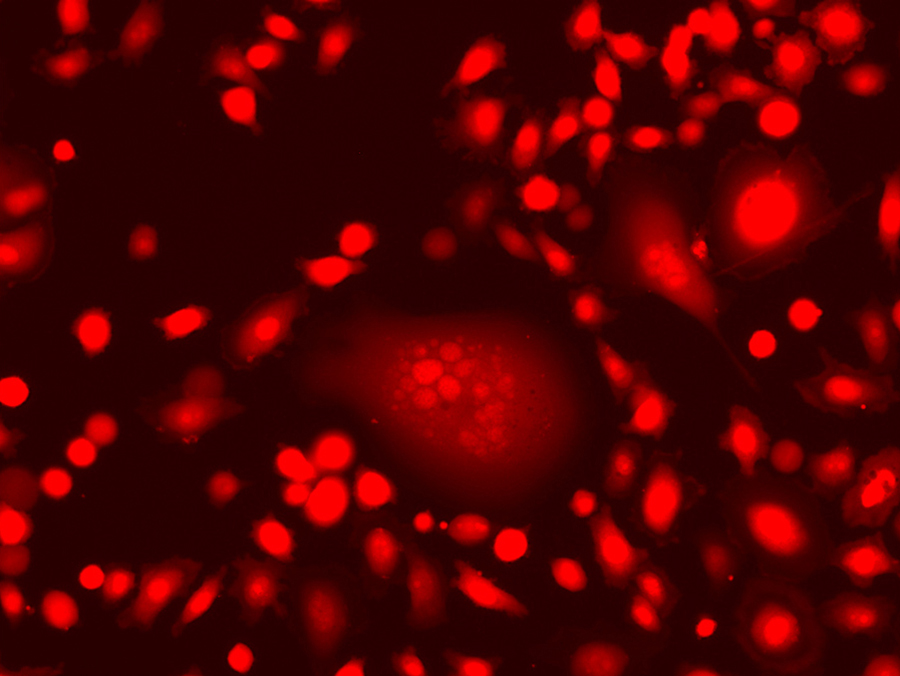Tag: Chemotherapy
CRISPR gene editing: Can we make cancer cells easier to kill?

Lung cancer accounts for approximately one in five cancer deaths globally. The high death toll makes the development of new treatments and improvement of old ones a top priority. One of the challenges with traditional chemotherapy is that tumours can develop resistance to treatment. For several years, Eric B Kmiec, PhD, at the Gene Editing Institute of ChristianaCare, USA and […]
Read More… from CRISPR gene editing: Can we make cancer cells easier to kill?
Nanoparticles as Trojan horses: A safe and effective way to deliver oncolytic viruses to treat all cancers

Advanced cancer often comes with a lack of treatment options. Immunotherapies like cancer-killing viruses – oncolytic viruses (OVs) – are becoming increasingly popular but are currently limited by their inability to be administered into the blood. However, Dr Faith Howard and Dr Munitta Muthana, researchers at the University of Sheffield in the UK, demonstrate that OVs can be injected into […]
Establishing the first set of guidelines for breast cancer management in Bosnia and Herzegovina

Breast cancer is the most common cancer in women worldwide. Specialised centres that monitor breast cancer patients can help improve disease outcomes by recording patient information and by helping to implement centralised guidelines for disease management. In Bosnia and Herzegovina there is no accurate data on breast cancer patients, nor any centralised guidelines. Dr Lejla Hadžikadić-Gušić, a breast surgical oncologist, […]
One cell’s death is a microbe’s DINNR: How intestinal bacteria use our dying cells as fuel

Until now, a great deal has remained unknown about the relationship between programmed cell death and bacterial infections. However, recent work by Dr CJ Anderson and Professor Kodi Ravichandran from VIB-UGent, Belgium, has shed new light on this topic and introduced a new layer to the complex host–pathogen interaction. The team has shown that dying mammalian cells produce and shed […]
World Cancer Day 2022: Innovations in cancer research

Despite cancer being a leading cause of death worldwide, detecting cancers early enough to treat them remains a significant challenge. World Cancer Day, held annually on February 4, presents an opportunity to celebrate the advances that have been made, and to reflect on the work still to be done. This blog post brings together five Research Outreach articles that outline […]
Read More… from World Cancer Day 2022: Innovations in cancer research
Exploring a novel approach to lung cancer treatment

Lung cancer, just like other types of cancer, is mostly treatable when diagnosed in the earliest stages. Treatments mainly include chemotherapy and surgeries such as sublobar resection and lobectomy. The thoracic surgical team led by Dr Calvin Ng at Prince of Wales Hospital, The Chinese University of Hong Kong, have successfully applied a novel approach to lung cancer treatment. They […]
Read More… from Exploring a novel approach to lung cancer treatment
AMP-activated kinase as a therapeutic target in prostate cancer

Pharmacological treatment of prostate cancer has advanced significantly in recent years. However, while the newest therapies are initially effective in reducing tumour size, most patients eventually develop drug resistance and the recurrence of malignant spread. Professor Inés Díaz-Laviada and her team at the Alcala University in Madrid, Spain, have demonstrated that long-term treatments may induce the transformation of cancer cells […]
Read More… from AMP-activated kinase as a therapeutic target in prostate cancer
The adaptive cancer cell: How metastases evolve to resist treatment

Species adapt to survive in a changing environment through the process of evolution. Evolutionary processes can also take place at the cellular level. Dr Sarah Amend of Johns Hopkins University, Baltimore, USA, is investigating poly-aneuploid cancer cells (PACCs). These large, DNA-laden cells, which are more common in metastatic cancer, develop evolvability: the capacity to evolve. Dr Amend believes that targeting […]
Read More… from The adaptive cancer cell: How metastases evolve to resist treatment
Halalopathy: Integrating mind, behaviour and health

With the current focus on personalised medicine, some physicians are searching for new ways to treat the patient as an individual. Dr Jawad Alzeer of the University of Zurich, Switzerland, proposes a novel approach to medicine: halalopathy. Under halalopathy, mind, behaviour and health are fundamentally connected. By prioritising the relationships between these three aspects of a person, Dr Alzeer believes […]
Read More… from Halalopathy: Integrating mind, behaviour and health
Transtympanic injections to prevent hearing loss caused by cisplatin

Dr Sofia Waissbluth from The Pontificia Universidad Católica de Chile is specialised in otolaryngology (conditions of the head and neck). She has reviewed clinical trials that use transtympanic injections to prevent hearing loss caused by the chemotherapeutic agent cisplatin. To date there is no ‘one-shot’ solution to protect or cure patients from hearing loss. However, combinational therapy using transtympanic injections […]
Read More… from Transtympanic injections to prevent hearing loss caused by cisplatin